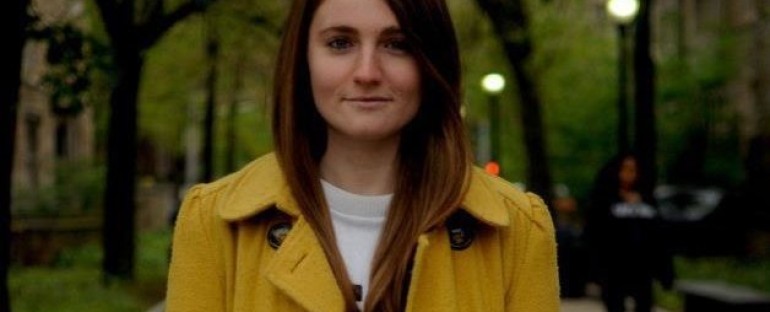Words are powerful.
I was reminded of just how powerful by a story that hit that hit just about every media channel last month.
Most news outlets focused on the tragedy of the “story”. Marina Keegan was a 22-year-old eagerly awaiting her 2012 commencement from Yale. She wrote an editorial for a special edition of the News that was to be distributed at the university’s commencement exercises. Unfortunately, a car accident took her life shortly after she penned her last campus newspaper column.
 The circumstances leading to Marina’s death are indeed tragic. But the real story
The circumstances leading to Marina’s death are indeed tragic. But the real story
was not just that she passed much too soon, but rather what she had to say and the way in which she said it.
Whether you’re 22, 42, 82 or somewhere in between, Marina’s words cannot help but resonate. In her editorial, she shared her perspective on life, her fears about the future and her hope that she could somehow recapture that feeling, that some undefined word that she called the “opposite of loneliness” which she experienced at Yale. Her words accomplished everything really great writing should do: evoke emotion, motivate, inspire and inform.
In putting into words how she felt about her time at Yale and the unknown future that was ahead of her, Marina wrote: “We don’t have a word for the opposite of loneliness, but if we did, I could say that’s what I want in life… It’s not quite love and it’s not quite community; it’s just this feeling that there are people, an abundance of people, who are in this together. Who are on your team.”
She noted, “There’s this sentiment I sometimes sense, creeping in our collective conscious … that it is somehow too late. That others are somehow ahead. More accomplished, more specialized. More on the path to somehow saving the world, somehow creating or inventing or improving. That it’s too late now to BEGIN a beginning and we must settle for continuance, for commencement.”
“But what we have to remember,” Marina said “is that we can still do anything. We can’t, we MUST not lose this sense of possibility because in the end, it’s all we have. ”
“I plan on having parties when I’m 30,” Keegan proudly proclaimed. “I plan on having fun when I’m old.”
Marina’s perspective on her life no doubt inspired others to take a good look at their own. For me, it served as a reminder that I must, each day, actively pursue “the art of the possible”. It made me want to make a promise to myself to:
• Work to live not live to work.
There’s a lot in life to explore and experience. There’s much more to life than what can be experienced through a Blackberry or iPad. Creating a balance in your life is the only way to achieve that feeling of the “opposite side of loneliness.”
• Re-connect with those who traveled with me on my own journey in college.
Like Marina, like most who have had college experience, I , too, had a group of fellow students who were by my side and on “my team” as I walked down that memorable road. Together, we learned the ropes of journalism as we navigated our first newsroom experience, our first bylines, our first front page story. We shared countless late night chat-a-thons over pizza and beer wondering what lied in store for us after graduation. The night before commencement exercises, we even made a bet (an agreement we made formal on a diner napkin and which I still have to this day) that the last one of us to succumb to a life of married bliss would collect a shiny $100 bill. (Technically I won that bet but never collected my winnings.) They’re moments in time I will never forget yet it is so easy to forget to stay connected when you move on to new jobs, new cities and new lives.
• Put myself out there; be open, honest and vulnerable.
The reason that Marina’s writing was so compelling is because it was written from a place of complete truth and sincerity. She let the whole world know about her fears and feelings and frustrations. It’s what makes a good story great. It also seems to be one of those things that gets harder to do as people get older. They put up walls. They let their fears get the best of them. Note to self: don’t be afraid to let yourself shine through.
• Give myself a break.
We all have great intentions. Sometimes we follow through with them, other times we don’t…or can’t. Beating ourselves up over it serves no purpose. Today is already here. But tomorrow gives us another chance to be better, do better and want better….for ourselves and those around us.
• Write to resonate.
So often we’re enmeshed in deadlines and budgets and office politics, it’s easy to forgot what Job #1 really is: to connect with customers, to communicate remarkably and, in my choice of career, to write to resonate. It’s not about pushing out tweets or updates or posts or newsletters or emails or more, more, more. It’s about crafting content and communication that has value and causes the recipient to pause and….reflect, think, change, or feel. Write. Resonate. Repeat. Rinse.
I have no doubt that had she lived, Marina would have gone on to do great things. She would have discovered that “opposite side of loneliness” outside the comfort of Yale’s safe cocoon of student camaraderie and security. She would have, I’m sure, continued to use words to make a difference in people’s lives.
I’m truly sorry she won’t get that chance. It is, then, left to the rest of us, to do it for her. To make a difference. With words. With heart. With intention.
So, dance like nobody’s watching Live like you promised yourself in college you would. Write with intention. Work to be remarkable.
Share This
Recent Blog Posts
- International Women’s Day: Taking action to gain traction
- Be a shoulder and a hand: 10 ways to help women in the workplace show up and shine up
- Unfinished Business: Content Marketing’s Role in Cracking the Glass Ceiling
- Lessons Learned from 84 Lumber’s Super Bowl Fail
- Brands Rise Up to Stand Out in Super Bowl 2017
Categories
Blog Post Tags
My Tweets

About Me
Portfolio Categories
Follow Me
Recent Posts
-
International Women’s Day: Taking action to gain traction
The first time I noticed men and women were treated...
-
Be a shoulder and a hand: 10 ways to help women in the workplace show up and shine up
International Women’s Day is an important day of...
-
Unfinished Business: Content Marketing’s Role in Cracking the Glass Ceiling
When it comes to tackling the gender equality issue...
-
Lessons Learned from 84 Lumber’s Super Bowl Fail
84 Lumber got it wrong on Super Bowl Sunday. In fact,...



















